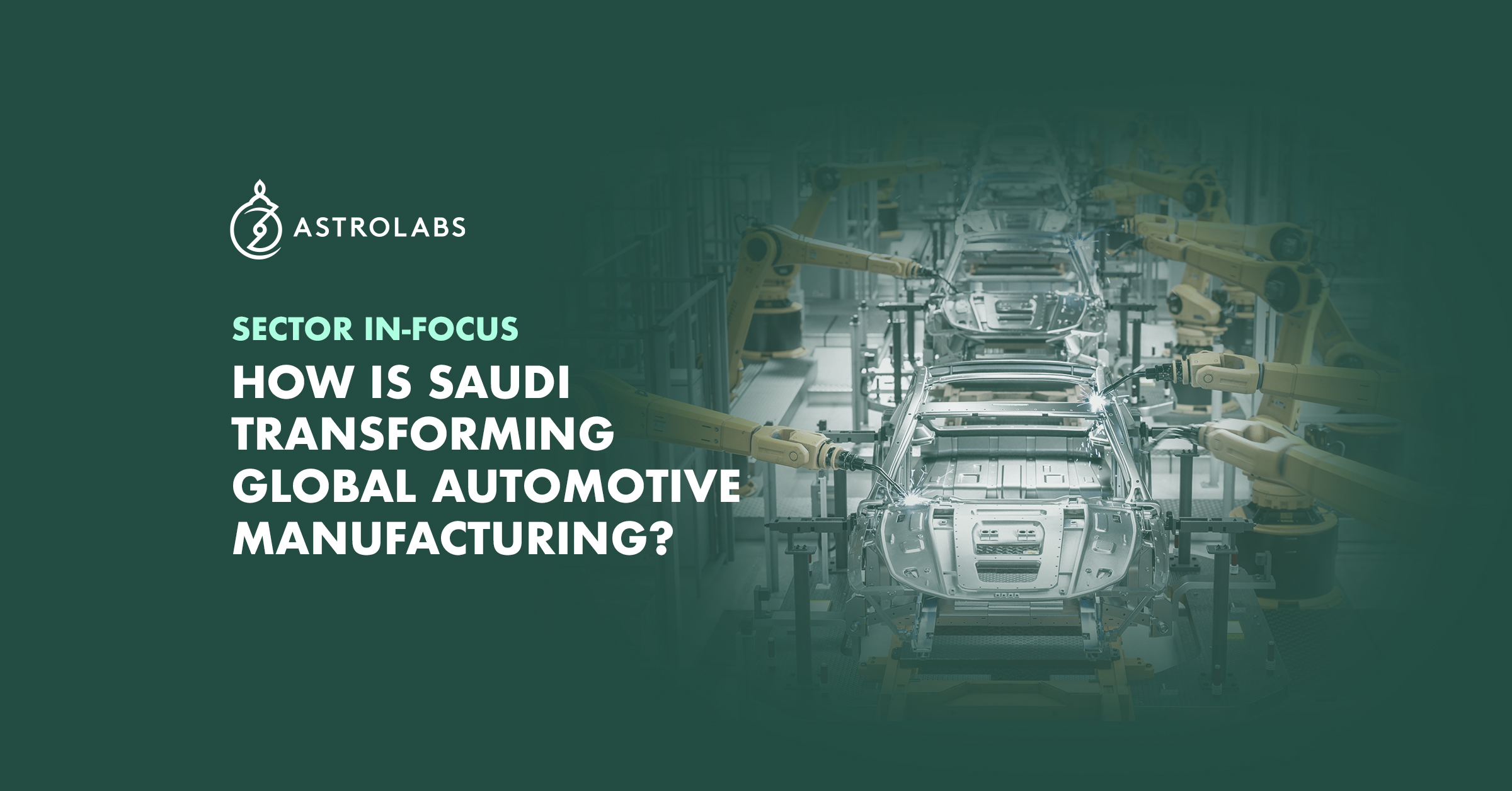Saudi Arabia has been actively working on decreasing its traditional dependence on oil exports. One key focus area is the manufacturing sector, with the country’s thriving automotive industry at its center, in line with the country’s vision to have 3–4 original equipment manufacturers (OEMs) producing over 400,000 passenger vehicles in Saudi Arabia by 2030.
The number of factories in the Kingdom increased by 10% in 2023, and 11,549 factories were operating by the end of the year. In addition, 1,379 new industrial licenses were issued, with investments amounting to SAR81 billion. The Saudi automotive manufacturing space has also seen a remarkable growth trajectory, achieving a CAGR of 4.22% over the period from 2024–2028. This year, the automotive components market is projected to see a record turnover of $2.06 billion in value added.
Saudi Progressive Vision for Automotive Manufacturing
The automotive manufacturing industry made headlines last year as a crucial component in the Kingdom’s shift away from importing final products to assembling and producing all vehicle parts domestically. The strategic push is aimed at stimulating economic growth through revenue generation and creating employment.
To that end, Saudi gears up to produce over 7600 Saudi-made products and increase its trade volume with 180 countries importing automotive products from the Kingdom; these developments highlight the KSA’s continued upward trajectory toward achieving its goals under the “Made in Saudi” project as part of Vision 2030.
Under the National Industrial Development and Logistics Program, the country is rapidly expanding its industries with the aim of becoming a leading industrial powerhouse and global logistics hub. At the fore of this fundamentally changing landscape are 160 vehicle manufacturers operating in the Kingdom, fueling innovation in the automotive space and transforming the status quo. Many of them are dedicated to the production of electric vehicles (EVs), a new frontier in the Saudi localization push of its automotive output.
The Saudi market is attractive to international companies looking to benefit from its $156 billion manufacturing sector, channeling their business expertise and technical know-how into the local market. This will make Saudi a testbed for innovation and a breeding ground for talents, further accelerating the growth of the Kingdom’s manufacturing sector. Manufacturing enterprises, expected to exceed 128.9k by 2024 with a projected CAGR of 2.68% from 2023 to 2028, reflect a landscape ripe for further advancement.
For example, WEG, a global manufacturing leader and one of AstroLabs’ expansion companies, recognized the opportunity early on. In 2022, the company expanded to Saudi via AstroLabs, with the aim of capitalizing on the first-mover advantage. In 2020, the global pioneer partnered with Saline Water Conversion Corporation (SWCC) to install their electric motors, MGW, and W60 lines at SWCC’s pumping station, driving water pumps and allowing smooth transportation of drinking water to the city of Madina.
The economic impact here is multifold, from supporting the Kingdom’s ongoing aim of economic diversification to creating a plethora of job opportunities. This also applies to the wider manufacturing landscape, which is set to be one of the country’s largest employers. Evidently, the total number of employees in manufacturing in Saudi Arabia is predicted to reach 1,237k by the end of 2024, with a CAGR of 3.96% expected from 2024 to 2028.
Evolving Electric Vehicle Infrastructure: Saudi EV Industrial Revolution
By 2030, 30% of vehicles in Riyadh will be powered by electricity, as per Vision 2030’s targets. With an estimated $50 billion in EV production expected over the next decade, Saudi is moving steadily toward this goal. In general, the EV market is expected to grow across the region, driven by continued government-led reforms, specifically in the realm of developing infrastructure for EVs.
Mordor Intelligence valued the Middle East and African EV market at about $40 million in 2021 and expects the figure to surpass $90 million by 2027 at a CAGR of over 15% for the period. As it continues to grow, the EV sector is witnessing a surge in high-level activity, with investments increasing exponentially.
Public Investment Fund (PIF) has shown its commitment to the EV market by channeling a substantial $10 billion into CATL, a leading Chinese battery manufacturer, back in October 2023. This move will diversify the PIF’s investment portfolio and align it with the global shift towards sustainable energy.
The momentum is expected to be propelled forward by the establishment of an integrated supply chain for EV manufacturing, a space well-prepared for disruption and innovation in light of the Kingdom’s efforts to become a logistical hub. Collaborations among industry leaders in the private sector play a crucial role in contributing to the development of a localized, robust EV supply chain. Examples include the announcement of the establishment of a tire manufacturing facility as a result of a joint venture with Pirelli and several electric vehicle and battery factories in partnership Lucid Motors and Hyundai.
Most notably, the Kingdom’s commitment to nurturing domestic EV production culminated with the launch of its first domestic electric vehicle brand, CEER Electric Vehicles. A few days ago, CEER announced the awarding of a SAR 5 billion ($1.3 billion) contract for the construction of the Center Electric Vehicle Manufacturing Complex in King Abdullah Economic City. This complex will be a benchmark for innovation and industrial value added in EV manufacturing globally
Regional entities are also shaping the EV and carrying market momentum forward. Petromin Corporation recently inaugurated Saudi first-ever EV maintenance center, designed to empower certified technicians with cutting-edge technology, tools, and tailored solutions for modern vehicle owners. These investments come in line with Saudi’s goal of reaching a production capacity of 300,000 vehicles by 2030.
In line with its long-term vision, Saudi is determined to create a hospitable entrepreneurial environment in the Kingdom, attracting fresh, innovative global startups looking for opportunities for investments and business integrations. Having a sustainable ecosystem that welcomes new technological advances brings the Kingdom a step closer to fulfilling its vision of having a more eco-friendly and self-sustaining future.
The expansion of the EV industry is largely driven by a growing governmental emphasis on sectors that are vital for revenue generation and improving its human capital and talent pipelines. This directly feeds into the Kingdom’s vision to be among the world’s top economies, in which the EV space plays a massive role.
The groundwork for achieving Saudi Vision 2030’s objectives for manufacturing and automotive is well underway, pointing toward long-term gains for Saudi and its people and lucrative investment opportunities for automotive, mobility, and manufacturing enterprises worldwide.

